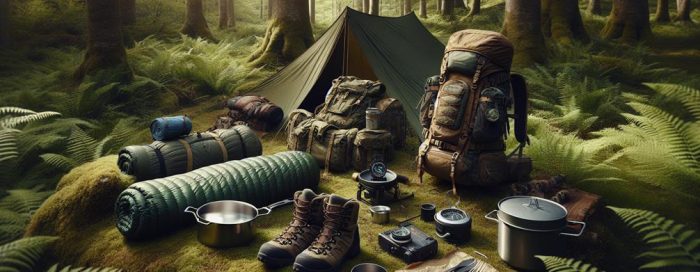When venturing into the great outdoors for bush camping, it's crucial to be well-prepared with the right gear to ensure a safe and enjoyable experience. From setting up your shelter to cooking meals and navigating the wilderness, having the essential equipment can make all the difference. But what exactly constitutes essential gear for bush camping? Well, let's break it down and make sure you have everything you need to make your next adventure a memorable one.
Shelter and Sleeping Gear
When preparing for bush camping, it's essential to choose a durable and weather-resistant tent to ensure protection from the elements. Look for a tent with a high hydrostatic head rating and taped seams to keep you dry during rainy weather. Additionally, consider the expected low temperatures and select a sleeping bag with an appropriate temperature rating to keep you warm at night. Look for sleeping bags rated for the coldest temperature you anticipate encountering. This will ensure a comfortable night's sleep and prevent any risk of hypothermia. By paying attention to weather resistant tent features and sleeping bag ratings, you can better prepare for the unpredictable conditions of bush camping and ensure a safe and enjoyable outdoor experience.
Cooking Equipment

To ensure a well-rounded bush camping experience, your cooking equipment should be just as durable and practical as your shelter and sleeping gear. Essential camping recipes can be easily prepared with a portable camping stove, lightweight cookware, and utensils. When cooking over an open fire, make sure to use heat-resistant gloves for safe handling of hot cookware and open flames. Additionally, a collapsible sink or basin will be essential for washing dishes and utensils after meals. Don't forget food storage containers to keep ingredients fresh and organized. With the right cooking equipment, you'll be well-prepared to enjoy delicious meals and create memorable experiences in the great outdoors.
Hydration and Water Purification

Ensure your bush camping experience includes adequate hydration and access to safe drinking water by bringing the necessary equipment and familiarizing yourself with reliable water sources.
Hydration and Water Purification:
- Water Filtration Options: Carry a portable water filtration system or purification tablets to ensure access to safe drinking water from natural sources.
- Importance of Staying Hydrated: Bring an adequate supply of water for each person, considering the trip duration and potential emergencies.
- Reliable Water Sources: Use a hydration pack or water bottles that can be easily refilled from reliable water sources along the way.
- Emergency Preparedness: Consider additional water storage containers to ensure a sufficient supply during unexpected delays or emergencies.
Campfire Tools and Safety Gear

Carrying a well-stocked first aid kit is essential for ensuring campfire safety during your bush camping experience. Additionally, always have a fire extinguisher readily accessible at your campsite. In case of any emergencies, having a comprehensive first aid kit will ensure that you are well-prepared to handle minor injuries. It's also crucial to utilize proper fire safety tools such as gloves, a shovel, and a bucket of water to prevent any mishaps. Consider investing in a multi-tool for various campsite tasks and repairs, and always prioritize safety by being aware of your surroundings and following local fire regulations. By adhering to these safety measures and having the necessary tools at your disposal, you can enjoy your bush camping experience with peace of mind.
Navigation and Lighting Essentials

When venturing into remote areas for bush camping, it is essential to equip yourself with navigation tools and lighting gear for a safe and enjoyable experience. Consider the following essentials:
- Navigation Tools: Carry a map, compass, or GPS for accurate navigation in remote areas. While a GPS offers precise location data, a compass is a reliable backup in case of technology failure.
- Lighting Gear: Bring headlamps and torches for hands-free lighting during nighttime activities. Opt for headlamps with adjustable brightness and a long battery life for convenience.
- Emergency Beacon: Consider a personal locator beacon for emergency use in difficult terrain. It provides a vital lifeline in case of emergencies.
- Backup Power: Pack spare batteries for lanterns, torches, and headlamps to ensure continuous lighting. Additionally, include a solar or portable power pack for charging navigation and lighting devices.

